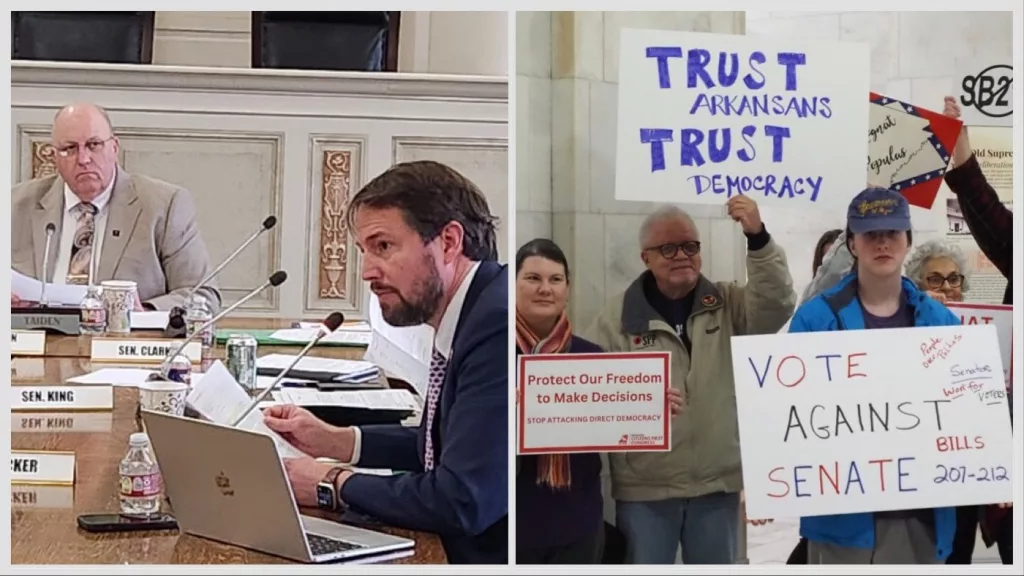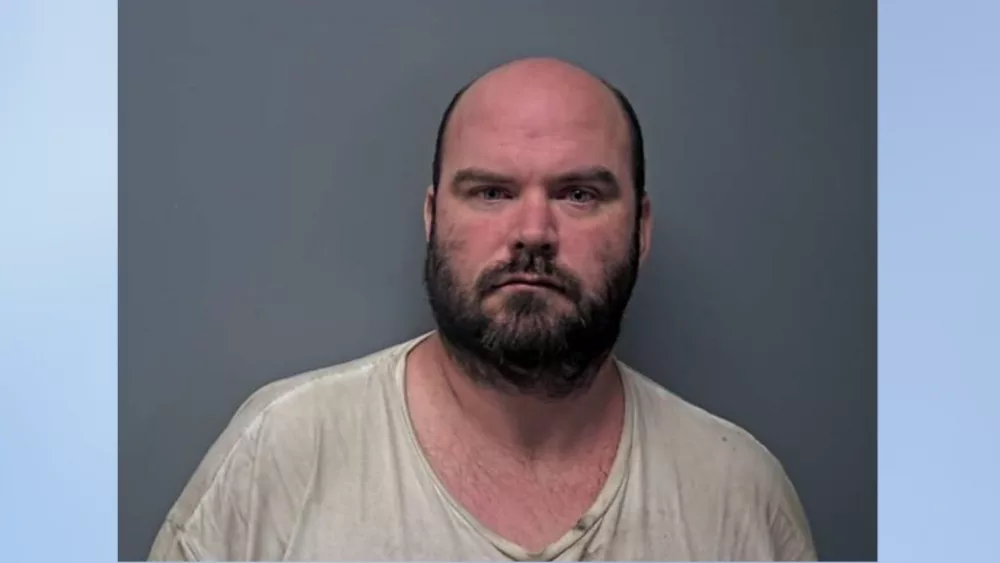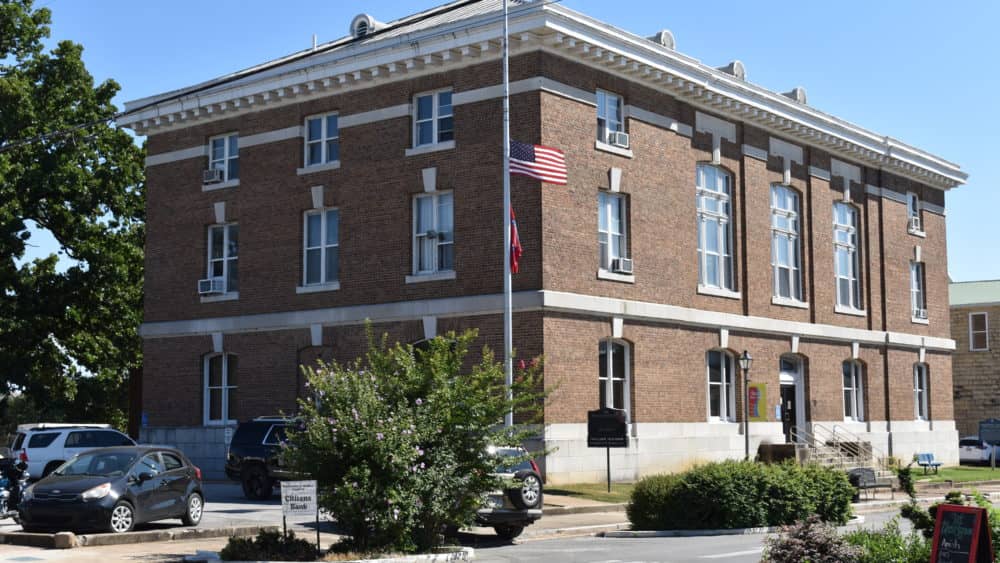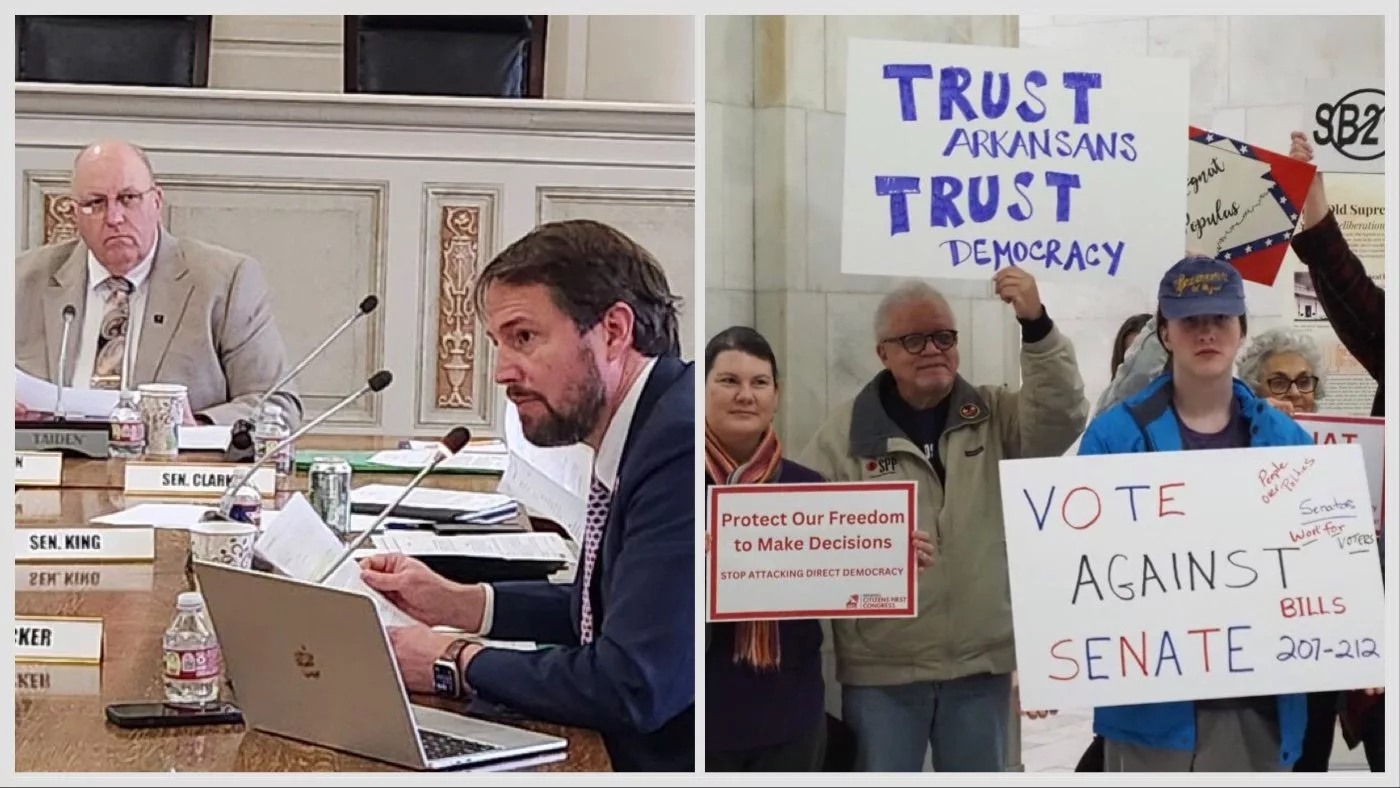
Left image: Sen. Clarke Tucker (center), D-Little Rock, asks a question during a meeting of the Senate Committee on State Agencies and Governmental Affairs on Tuesday, Feb. 11, 2025. At left is committee vice chairman Sen. John Payton, R-Wilburn. At right is Sen. Bryan King, R-Green Forest. (Tess Vrbin/Arkansas Advocate) / Right image: Protesters gathered outside a Senate committee meeting room at the Capitol on Feb. 11, 2025, to oppose bills related to the signature-gathering process. (Mary Hennigan/Arkansas Advocate)
By Antoinette Grajeda, Arkansas Advocate
A divided legislative panel advanced five of six bills that would alter Arkansas’ citizen-led petition process after more than three hours of debate Tuesday.
The Senate Committee on State Agencies and Governmental Affairs considered the legislation sponsored by Sen. Kim Hammer, R-Benton, who said his bills all had the goal of enhancing the integrity of Arkansas’ ballot initiative process.
“Each of these bills have been prepared working with the secretary of state’s office to assure that each bill safeguards the rights granted under the Constitution, while not infringing on the rights of citizens and their respective groups who want a safe, secure and integrity-driven process through which signatures can be gathered for an initiative.”
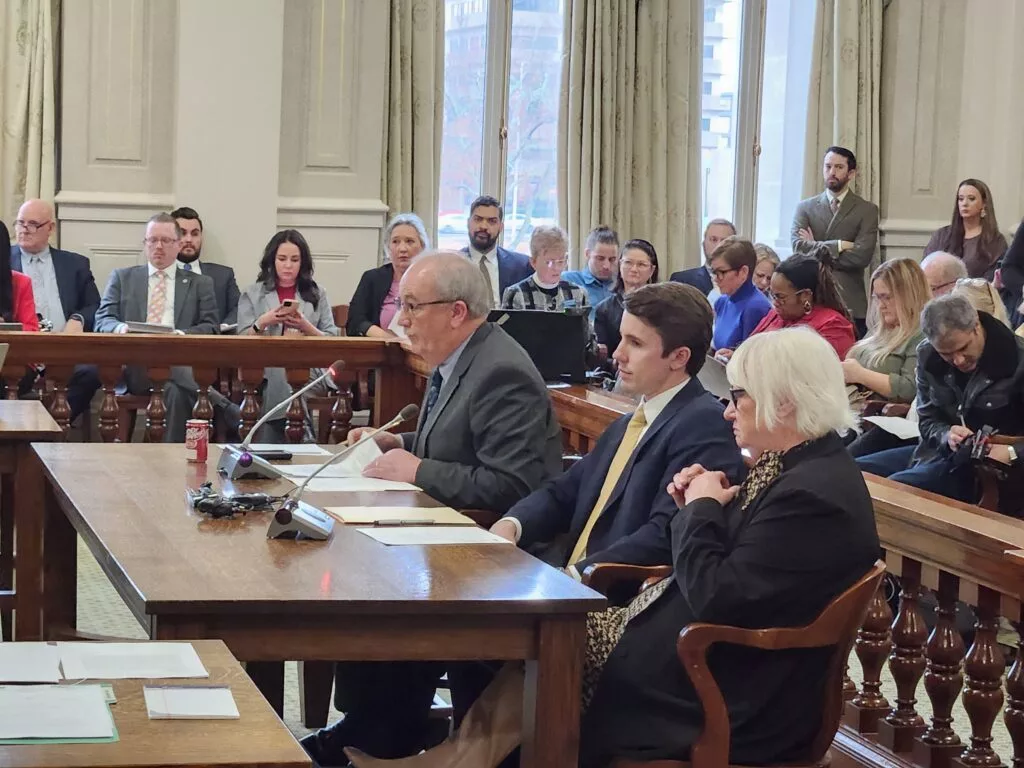 From left: Republican Sen. Kim Hammer of Benton, Deputy Secretary of State Nathan Lee and Secretary of State Director of Elections Leslie Bellamy answer questions about proposed laws that would alter the citizen-initiated ballot measure process before the Senate Committee on State Agencies and Governmental Affairs on Tuesday, Feb. 11, 2025. (Tess Vrbin/Arkansas Advocate)
From left: Republican Sen. Kim Hammer of Benton, Deputy Secretary of State Nathan Lee and Secretary of State Director of Elections Leslie Bellamy answer questions about proposed laws that would alter the citizen-initiated ballot measure process before the Senate Committee on State Agencies and Governmental Affairs on Tuesday, Feb. 11, 2025. (Tess Vrbin/Arkansas Advocate)
Under Article 5 Section 1 of the state Constitution, Arkansans can propose laws and constitutional amendments or repeal state laws through the initiative and referendum process, which requires citizens to collect a certain number of signatures that must be certified by state officials before being placed on the ballot for a vote. Arkansas’ elections are overseen by the secretary of state, a position Hammer is seeking in 2026.
The five bills advancing out of committee Tuesday:
- Senate Bill 207 would require canvassers to disclose that petition fraud is a Class A misdemeanor, which is punishable by up to 1 year in prison.
- Senate Bill 208 would require canvassers to request a photo ID from potential signers.
- Senate Bill 209 would disqualify signatures collected by canvassers if the secretary of state finds “by a preponderance of evidence” that they violated state law collecting the signatures.
- Senate Bill 210 would require potential signers to read the ballot title of a petition or have it read aloud to them in the presence of a canvasser. It would also make it a misdemeanor for a canvasser to accept a signature from people who have not read the ballot title or had it read aloud to them in the presence of a canvasser.
- Senate Bill 211 would require canvassers to file an affidavit with the secretary of state certifying they complied with the Arkansas Constitution and state laws related to canvassing, perjury, forgery and fraudulent practices in the procurement of petition signatures. Signatures submitted without the affidavit would not be counted.
All five bills contain an emergency clause, and if approved by the Legislature, would go into effect immediately upon the governor’s signature.
While discussing the bills Tuesday, Sen. Clarke Tucker, D-Little Rock, said direct democracy is a balancing act. Hammer’s concerns about guarding against misleading people about what they’re signing or the submission of invalid signatures are “on one side of the ledger,” Tucker said.
“On the other side of the ledger, there’s another harm, which is the people of Arkansas not being able to get their proposed ballot measures on the ballot, and we have to balance those against each other,” he said.
Comparing signature-gathering legislation to traffic laws, Tucker said laws are needed to protect against the inherent danger of driving. Stop signs could be placed at every intersection to make people safer, but the restrictions would eventually be so severe that it makes driving useless, he said.
“We’ve passed laws to make the signature-gathering process more difficult in every legislative session since 2013, and sometimes several times a session,” Tucker said. “And if you look at any one of these individual measures by itself, maybe it’s fine. But there comes a point where it’s death by a thousand cuts and it becomes too stifling.”
Hammer said he doesn’t subscribe to allowing the process to be less than 100% accurate, especially when there’s a way to ensure accuracy.
“I think that’s the greater danger that we face is that we begin to recognize that there are problems, and we are either too afraid to address them or we are intimidated out of addressing them,” he said.
Clarke has filed his own bill to address the ballot initiative process. Senate Bill 188 would require the posting of statewide initiative and referendum petitions on the secretary of state’s website, a proposal that Hammer said Tuesday he would support.
“This is a horrible power grab, and we need to be able to follow the rule of law and also have our input in the law,” Richard Swafford of Little Rock said.
Senate Bill 212, the sole bill rejected by the Senate committee, would have created the Document Validity Division, a law enforcement agency within the secretary state’s office that could investigate the validity of documents related to elections and ballot initiatives submitted to the office.
Hammer can bring the bill back to the committee at a later date. The five bills approved by the committee will next be considered by the full Senate.
Public debate
Arkansas’ petition-gathering process garnered much attention during the 2024 election cycle when groups gathered signatures for nearly a dozen ballot measures targeting the elimination of taxes on feminine hygiene products, expanded abortion access and increased government transparency.
Nearly all the measures failed to qualify for the ballot due to paperwork issues, insufficient signatures and legal challenges. The only initiative to qualify for the ballot and have votes counted for it was a proposal to repeal a Pope County casino license. Voters approved the measure in November.
More than a dozen supporters of direct-democracy efforts held signs and protested Hammer’s bills outside the committee room at the state Capitol Tuesday morning. Participants argued that Hammer’s bills would make it more difficult for Arkansans to participate in the petition process and make their voices heard.
“This is a horrible power grab, and we need to be able to follow the rule of law and also have our input in the law,” Richard Swafford of Little Rock said.
Inside the committee room, Dawn Shell from Saline County spoke in favor of Hammer’s efforts to keep voters from being misled. Shell, a pastor’s wife, said she signed a petition in support of women’s health without being shown a copy of the measure. It wasn’t until she was alerted by a friend who viewed signatures for an abortion-rights initiative that were obtained through the state’s Freedom of Information Act that Shell realized what she had signed.
“My name is now permanently attached to something that I do not believe in,” she said. “…Had I understood what I was signing, I would not have signed my name to allow it to be put on the ballot.”
Jen Standerfer, who worked with and carried petitions for a group that pursued government transparency initiatives during the 2024 general election, spoke against Hammer’s bills. The Bentonville attorney said she questioned the constitutionality of some provisions within the legislation. Standerfer argued that asking someone to sign a petition is like candidates asking someone to vote for them, forms of speech protected under the First Amendment.
“These are not the sorts of restrictions we would ever put on campaign speech when we think of campaigns in terms of candidates, but under the law, issue speech is also campaign speech,” she said. “It has the same protections, and it should have the same protections.”
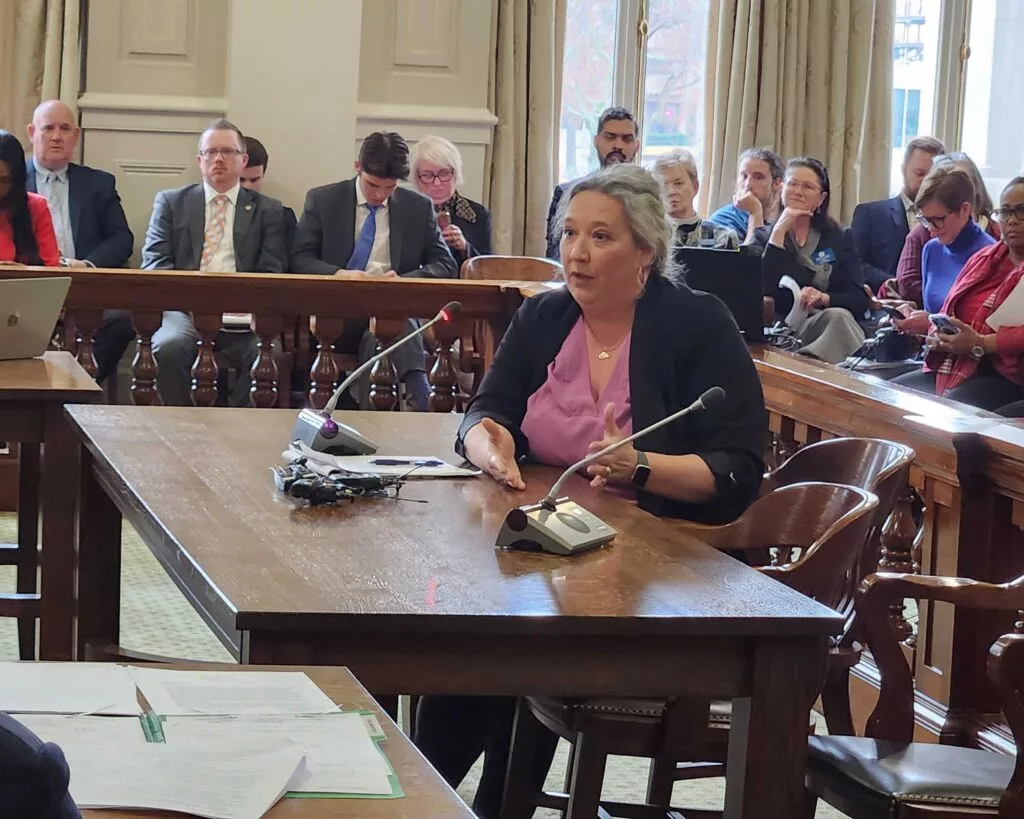 Attorney Jen Standerfer testifies against proposed Arkansas laws that would alter the processes for citizens to introduce ballot measures on Tuesday, Feb. 11, 2025 before the Senate Committee on State Agencies and Governmental Affairs. (Tess Vrbin/Arkansas Advocate)
Attorney Jen Standerfer testifies against proposed Arkansas laws that would alter the processes for citizens to introduce ballot measures on Tuesday, Feb. 11, 2025 before the Senate Committee on State Agencies and Governmental Affairs. (Tess Vrbin/Arkansas Advocate)
Hammer said Arkansas’ attorney general reviewed his proposed legislation, deemed it constitutional and stood ready to defend it if challenged in court. He asked Standerfer if she disagreed with his assessment.
Standerfer said she did for three reasons — it’s the attorney general’s job to defend the state, “the Supreme Court does not work for him, and sometimes he’s wrong.”
Though many people signed up to speak about the bills, public testimony was cut short by lawmakers who voted to end discussion and take a vote on the bills after more than three hours of discussion.
Some members of the public who were unable to testify told the Advocate after the meeting they were disappointed by the committee’s vote. Retired Presbyterian pastor Rev. Linda Whitworth-Reed said the bills were creating “more roadblocks for free speech,” while Nell Matthews, treasurer for the League of Women Voters of Arkansas, said the proposals would “take away direct democracy from the average citizen.”
“The whole business is just to slow people down and intimidate people and prevent them from signing,” Matthews said. “The idea that a canvasser is going to be prosecuted if there’s evidence that they didn’t do the various steps — all that takes is two bad actors coming in and saying, ‘She didn’t look at my ID’ [or] ‘She didn’t read the ballot title.’”
The Arkansas Advocate’s Tess Vrbin and Mary Hennigan contributed to this story.
The Arkansas Advocate is a nonprofit, nonpartisan news organization dedicated to tough, fair daily reporting and investigative journalism that holds public officials accountable and focuses on the relationship between the lives of Arkansans and public policy.
Have a news tip or event to promote? Email White River Now at news@whiterivernow.com. Be sure to like and follow us on Facebook and Twitter. And don’t forget to download the White River Now mobile app from the Google Play Store or the Apple App Store.
Get up-to-date local and regional news/weather every weekday morning and afternoon from the First Community Bank Newsroom on Arkansas 103.3 KWOZ. White River Now updates are also aired weekday mornings on 93 KZLE, Outlaw 106.5, and Your FM 99.5. And catch CBS News around the top of every hour on 1340 KBTA.








